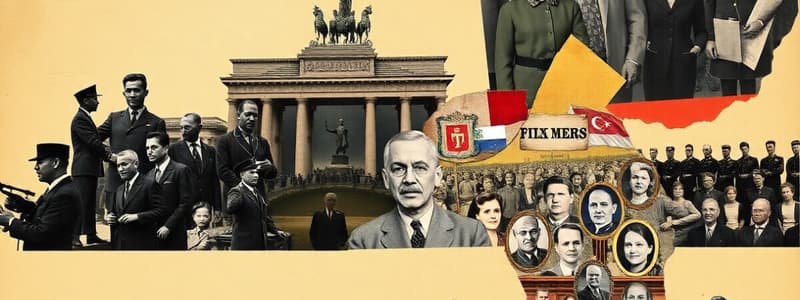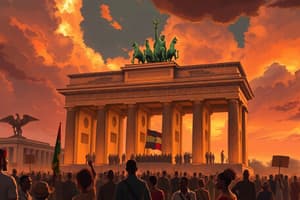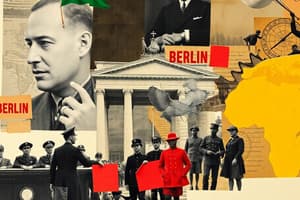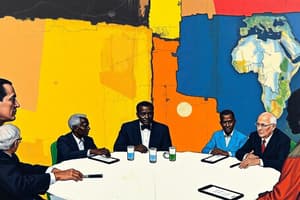Podcast
Questions and Answers
How does Shonibare's art reflect contemporary global issues?
How does Shonibare's art reflect contemporary global issues?
Shonibare's art explores issues like water shortages, climate change, class, race, and exploitation.
What was the significance of the Berlin Conference of 1884-85 for Africa?
What was the significance of the Berlin Conference of 1884-85 for Africa?
The Berlin Conference established the colonial boundaries in Africa, which have hindered independent development.
In what way does the inherited political geography from colonialism pose challenges for African independence?
In what way does the inherited political geography from colonialism pose challenges for African independence?
Inherited political geography creates artificial borders and political structures that complicate genuine self-governance.
What are some of the long-term effects of the decisions made during the Berlin Conference?
What are some of the long-term effects of the decisions made during the Berlin Conference?
How is the view of the Berlin Conference's impact on Africa reflected in African Studies?
How is the view of the Berlin Conference's impact on Africa reflected in African Studies?
What is repatriation in the context of cultural artifacts?
What is repatriation in the context of cultural artifacts?
What distinguishes a national language from an official language in Nigeria?
What distinguishes a national language from an official language in Nigeria?
What are some pros of using English as Nigeria's official language?
What are some pros of using English as Nigeria's official language?
Define an exoglossic language and give an example related to Nigeria.
Define an exoglossic language and give an example related to Nigeria.
What is the significance of adopting an indigenous language as Nigeria's official language?
What is the significance of adopting an indigenous language as Nigeria's official language?
How does pidgin English function as a lingua franca in Nigeria?
How does pidgin English function as a lingua franca in Nigeria?
What does 'no wahala' mean in Nigerian pidgin English?
What does 'no wahala' mean in Nigerian pidgin English?
Why is there a desire to change the official language in Nigeria?
Why is there a desire to change the official language in Nigeria?
What metaphor did King Leopold II use to describe Africa, and what does it indicate about European attitudes at the time?
What metaphor did King Leopold II use to describe Africa, and what does it indicate about European attitudes at the time?
Which European nations participated in the Scramble for Africa?
Which European nations participated in the Scramble for Africa?
How does the cartoon featuring Cecil John Rhodes illustrate British imperial power?
How does the cartoon featuring Cecil John Rhodes illustrate British imperial power?
What was one significant outcome of the Berlin Conference of 1884-1885?
What was one significant outcome of the Berlin Conference of 1884-1885?
What is the meaning of 'nibble' in the context of post-1880 European involvement in Africa?
What is the meaning of 'nibble' in the context of post-1880 European involvement in Africa?
What does the phrase 'the true interests of the natives at heart' imply about colonial motives?
What does the phrase 'the true interests of the natives at heart' imply about colonial motives?
What artistic representation did Yinka Shonibare create regarding the Scramble for Africa?
What artistic representation did Yinka Shonibare create regarding the Scramble for Africa?
How did the phrase 'grab' convey the nature of European colonial actions in Africa?
How did the phrase 'grab' convey the nature of European colonial actions in Africa?
What actions did the Biafra government take to isolate itself economically?
What actions did the Biafra government take to isolate itself economically?
How did international involvement shape the Biafran Civil War?
How did international involvement shape the Biafran Civil War?
What was the outcome of the Biafran Civil War?
What was the outcome of the Biafran Civil War?
What was the central demand of the young nationalists in the 1930s Nigeria?
What was the central demand of the young nationalists in the 1930s Nigeria?
How did historiography affect the understanding of events in Biafra?
How did historiography affect the understanding of events in Biafra?
Who were the Benin bronzes significant to, and why?
Who were the Benin bronzes significant to, and why?
How did World War II impact the Nigerian economy?
How did World War II impact the Nigerian economy?
What event triggered the British punitive response in 1897?
What event triggered the British punitive response in 1897?
What significant political structure was established in Nigeria in 1954?
What significant political structure was established in Nigeria in 1954?
What were the consequences of the Benin Punitive Expedition?
What were the consequences of the Benin Punitive Expedition?
Who became Nigeria's first Prime Minister in 1957 and what notable background did he have?
Who became Nigeria's first Prime Minister in 1957 and what notable background did he have?
Where are the Benin bronzes currently located, and what is the impact of their location?
Where are the Benin bronzes currently located, and what is the impact of their location?
What major discovery in 1956 influenced Nigeria's economic landscape?
What major discovery in 1956 influenced Nigeria's economic landscape?
What was the 'national question' that Nigeria faced after independence?
What was the 'national question' that Nigeria faced after independence?
What characterized the definition of a 'state' according to the context provided?
What characterized the definition of a 'state' according to the context provided?
What were the outcomes of increased regional competition in Nigeria during the post-WWII era?
What were the outcomes of increased regional competition in Nigeria during the post-WWII era?
What was the primary purpose of the Berlin Conference in relation to Africa?
What was the primary purpose of the Berlin Conference in relation to Africa?
How did colonization contribute to the presence of English speakers in Africa?
How did colonization contribute to the presence of English speakers in Africa?
Define 'imperialism' in the context of colonization.
Define 'imperialism' in the context of colonization.
What does the term 'civilization' symbolize in the context of British imperialism?
What does the term 'civilization' symbolize in the context of British imperialism?
Identify and explain one of the three dimensions of civilization proposed by R.G. Collingwood.
Identify and explain one of the three dimensions of civilization proposed by R.G. Collingwood.
What role did the concept of 'sacred' play in the justification of colonial actions?
What role did the concept of 'sacred' play in the justification of colonial actions?
What does the term 'Scramble for Africa' imply about the nature of colonial competition?
What does the term 'Scramble for Africa' imply about the nature of colonial competition?
In what ways did colonialism impact the political control of indigenous populations in Africa?
In what ways did colonialism impact the political control of indigenous populations in Africa?
Flashcards
Berlin Conference
Berlin Conference
A meeting held in Berlin in 1884-85 where European powers formalized the division of Africa into colonies.
Colonial Boundaries
Colonial Boundaries
The political boundaries drawn by European powers during the Berlin Conference, which continue to influence the political landscape of Africa today.
Colonial Legacy
Colonial Legacy
The economic and political structures imposed by European colonizers, which have hindered Africa's development after independence.
Berlin Conference and Modern African Challenges
Berlin Conference and Modern African Challenges
Signup and view all the flashcards
Consequences of Colonial Partition
Consequences of Colonial Partition
Signup and view all the flashcards
Colonization
Colonization
Signup and view all the flashcards
Colonialism
Colonialism
Signup and view all the flashcards
Imperialism
Imperialism
Signup and view all the flashcards
Scramble for Africa
Scramble for Africa
Signup and view all the flashcards
Civilization
Civilization
Signup and view all the flashcards
Three Dimensions of Civilization
Three Dimensions of Civilization
Signup and view all the flashcards
What is colonization?
What is colonization?
Signup and view all the flashcards
Pan-Movement
Pan-Movement
Signup and view all the flashcards
Civil Disorder
Civil Disorder
Signup and view all the flashcards
Kinship Union
Kinship Union
Signup and view all the flashcards
Trade Unions
Trade Unions
Signup and view all the flashcards
Sovereign State
Sovereign State
Signup and view all the flashcards
Acquiring Internal Self-Government
Acquiring Internal Self-Government
Signup and view all the flashcards
The National Question
The National Question
Signup and view all the flashcards
Civil War
Civil War
Signup and view all the flashcards
The African Cake
The African Cake
Signup and view all the flashcards
European Powers in the Scramble for Africa
European Powers in the Scramble for Africa
Signup and view all the flashcards
Cecil John Rhodes
Cecil John Rhodes
Signup and view all the flashcards
Economic Motives of Colonization
Economic Motives of Colonization
Signup and view all the flashcards
Grab
Grab
Signup and view all the flashcards
Yinka Shonibare's Scramble for Africa
Yinka Shonibare's Scramble for Africa
Signup and view all the flashcards
Repatriation
Repatriation
Signup and view all the flashcards
Official Language
Official Language
Signup and view all the flashcards
National Language
National Language
Signup and view all the flashcards
Lingua Franca
Lingua Franca
Signup and view all the flashcards
Exoglossic Language
Exoglossic Language
Signup and view all the flashcards
Endoglossic Language
Endoglossic Language
Signup and view all the flashcards
Pidgin Language
Pidgin Language
Signup and view all the flashcards
Pidgin
Pidgin
Signup and view all the flashcards
Who are the Igbo people?
Who are the Igbo people?
Signup and view all the flashcards
What is Biafra?
What is Biafra?
Signup and view all the flashcards
What is the Biafra War?
What is the Biafra War?
Signup and view all the flashcards
How did Biafra try to establish independence?
How did Biafra try to establish independence?
Signup and view all the flashcards
What is propaganda in the context of the Biafra War?
What is propaganda in the context of the Biafra War?
Signup and view all the flashcards
How was the international community involved in the Biafra War?
How was the international community involved in the Biafra War?
Signup and view all the flashcards
What is historiography and how does it relate to the Biafra War?
What is historiography and how does it relate to the Biafra War?
Signup and view all the flashcards
What are the Benin Bronzes?
What are the Benin Bronzes?
Signup and view all the flashcards
Study Notes
Scramble for Africa and the Berlin Conference
- Colonization is the process of settling in a place and establishing political control, often involving settling among and controlling indigenous populations.
- Colonialism is the policy or practice of acquiring full or partial political control over a country, often with settlers and exploitation for economic gain.
- Imperialism is the policy of extending a country's power and influence through colonization, use of military force and other means.
- The Berlin Conference (1884-1885) was a crucial turning point in the colonization of Africa.
- The conference was about dividing Africa among European powers.
- “Scramble for Africa” refers to the rapid division of the continent among European powers, driven greatly by economic motives, and the concept of ‘civilization.’
- A cartoon depicting Britannia (the personification of Britain) depicted African men surrendering to her power.
- The concept of 'civilization' was used to justify violence against indigenous peoples.
- The conference resulted in artificial boundaries that didn't consider existing ethnic or political structures within Africa.
- This had a detrimental legacy for the development of the continent.
- The 1884-85 Berlin Conference resulted in the division of Africa among European powers.
- R. G. Collingwood (1889-1943) highlighted three dimensions of civilization: social, economic, and legal.
- The concept of “Africa cake” was used to describe competition for the continent.
- King Leopold II of Belgium was one of the European leaders involved in the scramble for Africa.
- There were existing African political and economic systems before European intervention.
Nigeria Specifics
- Nigeria was divided into 3 main regions: Northern, Western, and Eastern.
- Nigeria gained independence in 1960.
- The country faced colonization from Britain, with regions annexed and amalgamated.
- Colonialism had far-reaching consequences.
- Nigeria experienced major ethnic and political tensions following independence.
- The country had a civil war (1967-1970) which created divisions and lasting effects.
- The Berlin Conference significantly shaped many countries' boundaries, including Nigeria’s, hindering post-colonial development.
- Nigeria has 36 states today, a significant increase from the 3 states in 1960
- Major population centers include Lagos, Kano, Ibadan, Kaduna, Port Harcourt, Benin City, and Maiduguri. This information is provided, showing that the population is concentrated in certain places within the country.
- It was divided into various protectorates before the amalgamation
- The major ethnic groups are the Hausa, Yoruba, and Igbo which are important for understanding socio-cultural influences within the nation.
- Nigeria had 2 main rivers Niger and Benue
- Important dates of concern include the abolition of the slave trade (1807), British annexation of Lagos (1861), the Berlin Conference (1884-1885).
- The Biafra War occurred from 1967-1970
Colonialism and Language
- The impact of colonization is reflected in Nigeria's diverse linguistic landscape, with multiple semi-national and minor languages along with English.
- This suggests that language remains a powerful factor in national identity and cultural representation.
- There was a lot of conflict regarding the official language of Nigeria.
- The current official language is English but the process of official language selection is problematic.
- English is used for administration, government, and education.
- The legacy of colonialism on language use within the country presents important implications for national identity and cultural practices.
Studying That Suits You
Use AI to generate personalized quizzes and flashcards to suit your learning preferences.




